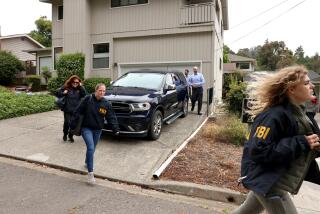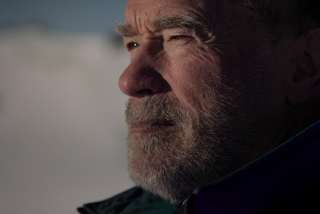Accuser Cites Unlikely Clinton Confidant
- Share via
WASHINGTON — Until Kathleen E. Willey burst into the national consciousness in recent days, few people outside the inner workings of the Clinton White House and the Democratic Party’s fund-raising operations had ever heard of Nathan Landow.
But now the real estate developer and former chairman of the Maryland Democratic Party finds himself under the glare of the national media as an important figure in the investigation of the president’s conduct.
If Willey’s account is accurate, Landow, 65, is part of a behind-the-scenes effort by Clinton supporters to silence women who have been linked to him.
In an explosive interview broadcast Sunday on CBS-TV’s “60 Minutes,” Willey described in detail what she said was an unwanted sexual encounter with Clinton just outside the Oval Office in November 1993. In addition, she also said she had discussed the incident “extensively” with Landow.
Allegations that Landow or others sought to pressure Willey not to talk about the matter have now become a focus of independent counsel Kenneth W. Starr’s criminal investigation into whether Clinton and his supporters have sought to obstruct justice.
Willey, who is now cooperating with Starr’s prosecutors in their probe, declined during her “60 Minutes” appearance to discuss details of Landow’s involvement.
“60 Minutes” interviewer Ed Bradley asked: “It’s been reported that he [Landow] has brought pressure on you not to talk about it publicly. Is that true?” Willey responded: “I can’t say at this point, because of the--all that’s going on.”
While Starr is conducting the criminal investigation into possible obstruction of justice, Landow’s name also has surfaced in connection with the sexual-harassment lawsuit against Clinton by Paula Corbin Jones, the former Arkansas government employee who alleges he made a crude sexual proposition in a Little Rock hotel room seven years ago.
Among the documents filed Friday by Jones’ lawyers is a request seeking permission to question Landow under oath.
During Willey’s deposition in the Jones case on Jan. 11, she said no one had sought to stop her from talking about the alleged incident with Clinton. But more than a month later, on Feb. 20, Willey offered a substitute answer to that question. Instead, she said: “Nate Landow discussed my upcoming deposition testimony with me.”
In a statement issued by his attorneys on Monday, Landow denied all the allegations that have surfaced about his involvement.
“Nathan Landow has made no attempt whatsoever to influence Ms. Kathleen Willey concerning her testimony with respect to President Clinton,” said the statement, issued by the Washington law firm of Miller, Cassidy, Larroca & Lewin. “News reports which suggest that Mr. Landow may have attempted to obstruct justice with respect to Ms. Willey’s testimony are categorically false.”
In fact, Landow’s history suggests that it would be unlikely that Clinton would turn to him for such a sensitive and dangerous task. Although he has strong ties to the Clinton administration, his strongest connections are not to Clinton, but to Vice President Al Gore.
Indeed, White House aides, speaking on background, sought Monday to play up old wounds between Clinton and Landow to put some distance between the two. Those aides pointed to political friction dating back to Landow’s opposition to Clinton as the Democratic presidential nominee in 1992, which White House aides stressed have never fully healed.
“It’s no secret that tensions have remained between Landow and the Clinton team ever since 1992,” stressed a White House aide.
Those tensions were well documented during the 1992 campaign. During the primary season, Landow, then chairman of the Maryland party, supported the campaign of former Sen. Paul E. Tsongas (D-Mass.). And in February 1992, Landow publicly attacked Clinton when a controversy erupted over whether Clinton had dodged the draft during the Vietnam War.
Even after Clinton had all but locked up the Democratic nomination, Landow led a group of disgruntled Democrats who raised the possibility of throwing open the Democratic convention to select an alternative to Clinton.
In April 1992, Ronald H. Brown, then-Democratic Party chairman, abruptly canceled an appearance before a group of major Democratic fund-raisers, led by Landow, out of fear that they would openly voice their doubts about Clinton.
As a result of all that political baggage, White House aides argue, Landow has never been particularly close to the president--and certainly doesn’t qualify as a trusted intimate who would be given the task of silencing a potential witness against him.
Instead, Landow’s entree into the administration was through his connections to Gore. Landow’s support of Gore included major donations to his 1988 presidential campaign.
More to Read
Sign up for Essential California
The most important California stories and recommendations in your inbox every morning.
You may occasionally receive promotional content from the Los Angeles Times.














